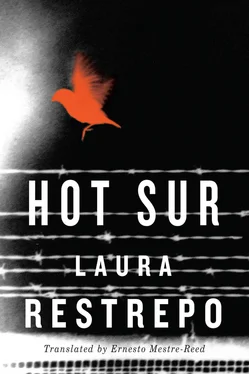“Do you have a cigarette by any chance?” she asked him.
The man pulled out a box of Marlboros, gave her a cigarette, and lit it with a Zippo before he moved along. Then and only then, while she pretended to smoke and tried not to cough, did she dare look at her watch for the first time. It was still ten minutes before the scheduled opening of the trial, 11:30 a.m. The alarm bells had not gone off yet; the hounds had not been let loose. She still had at least twenty minutes before they began to suspect she might not show and started looking for her. She stayed in place till her pulse recovered to normal. It didn’t matter if fires raged inside, as long as outside the air seemed calm. Purposefully, she kept the air of a well-dressed, handsome woman in her sunglasses on a cigarette break by her car — nothing so strange about that: Why would she smoke inside the car and stink it all up? Anyone who saw her would think nothing of it, just a woman who now casually crushed the butt of the cigarette on the pavement, a regular person, maybe a secretary or a lawyer, or someone who worked in the administrative offices of the court, certainly not a former inmate at Manninpox; those folks did not look so decent, they did not own two-thousand-dollar Gucci bags.
From some nook in her mind, the elusive image of a dream from the previous night alighted: a huge vagina made of cloth, just the thing itself, unattached, the edges sewn together and round as a ball. Furry, rabbit-like creatures poke out of gashes in the vagina, but they are indeed not rabbits. Someone tells her that one of the creatures is ill, and she picks it out right away, because it is the one throbbing. She cuddles it in her hands and calms it down because she knows that this little beast, or whatever it is, will be safe with her. She gives it a three-letter name that she has never heard before: AIX. The little creature immediately responds to the name. And that’s it, that’s all she remembers, because the dream bursts and vanishes like a soap bubble.
But María Paz remembered the name, and before leaving the parking lot, she wrote it with her finger in the coat of dirt on the cherry-red car. At the last moment, she noticed that Pro Bono’s Lamborghini was parked nearby. It had to be his, there was no mistaking it, and it would have been too much of a coincidence that there were two of them there. Her first thought was to hide underneath it until the lawyer came back, ask him what happened, why he had made her flee, figure out what happened, count on him to escape, rely on him, take shelter under his wing. But she immediately thought otherwise. She didn’t have to ask Pro Bono anything. She had to believe him and go. He must have had his reasons and that was enough for her. Also, she couldn’t put him in a compromising position; the old man had risked all he could, and she couldn’t ask him for more. No, from that point on, she was her own boss; she was alone. From now on, I will depend on me. All she had to do, her main task, was to get the hell out of New York, the city that opened up before her like a sea. She left the parking lot, mixed in with the passersby on Melrose Avenue, and took the first bus that came along. She got off after a few stops, not really knowing where, and walked as fast as the tight skirt and high heels allowed her. Above all else she needed to be quick on her feet, so when she walked by the first cheap Chinese street vendor, she bought a pair of cloth slippers that she immediately put on, tucking the high heels in her bag in case she needed them later. It was like in those movies where the good guy changes clothes so the bad guys following him won’t recognize him. María Paz took off her coat with the same purpose in mind, pulled out the hairpins holding up her bun, and let her hair fall down her back, her exquisitely black long hair like that of Our Lady of Mount Carmel.

María Paz knew New Yorkers well: she was aware that a select few of them walked down the street in a hurry to get somewhere, well dressed, thin, attired in black and charcoal gray, while the great lot of the rest of them went around dressed as if for a carnival, a grandiloquent parade of ridiculous and absurd Third Worlders. And if only a few moments before she needed to look as if she were one of the snooty ones, now she needed to blend into the anonymous crowd. So at another vendor, she tried on an ensemble of green, red, and yellow scarves, hat, and gloves, an unsightly combination only worn by certain Caribbeans, curiously only where it was hot. She looked at herself in the mirror the salesman had handed her and laughed at the thought of what Bolivia would have said if she had seen her like this — Bolivia, who had always been so well kept, with her light, inoffensive colors — not to mention what Socorro Arias de Salmon, who was so afraid to seem different, would have said. And there was how she, María Paz herself, would have looked upon all this just a few years ago, when she was so terrified of being perceived as having bad taste that she couldn’t breathe, and her main goal was not to seem like Latina trash, so she dissimulated her accent, avoided mentions of her nationality, and made sure to stress time and again that Latinos were not all drug traffickers, not all terrorists or members of the Mara Salvatrucha or the Revolutionary Armed Forces of Colombia. Off she went, with the multicolored knit cap pressed down to her eyebrows, the accompanying wool scarf instead of the silk one around her neck, those ridiculous gloves on her hands, the cloth slippers on her feet, and, hanging above her head, the bench warrant and bad name and criminal history. Fuck, wearing all this, who was she going to impress or convince of her innocence? But she was no longer obliged to convince or obey anyone, or be anywhere on time, or look good for anyone, or buy anything, or cancel subscriptions, or pay bills on time, or be or not even be a good lover, or get good grades, or be prettier or skinnier, or show up for an arraignment, or pass any test. None of that, zilch, zero. Jesus Fucking Christ, she thought, putting on this goofy cap has been the most liberating action of my life. Of course, she still had the Gucci bag, which clashed badly with her new look. She thought she should just toss it somewhere, casually throw it out somewhere, or give it to a passerby. But then all eyes would be on her. It would be a major scene, even in a city that has seen everything; people don’t just give Gucci bags to strangers. And shit, why would she give away such a marvelous gift from her lawyer? No sir, she would never again own such a precious thing, that Italian aroma, the thick buckles and perfect size that molded to her hip in such loving fashion.
In one of the subways she took that day, someone next to her was reading the Daily News , and she had been able to get a peek at the pictures and headlines. What an exposé, right in the middle of the paper. On the right page, a picture of a very young and handsome Greg in his police uniform, and on the left page, Greg’s crumpled body in a pool of blood. An emotionally moving picture of Greg with Hero. And one last picture, darker and much smaller, of María Paz herself. The mug shot from Manninpox, her hair a mess, looking like a lioness in heat, the placard with the serial number hanging on her chest. The visual was very obvious: the demented Colombian versus the good American cop. Pro Bono had always told her that juries were very susceptible to the whims of public opinion, and this kind of publicity must have exacerbated their patriotic spirit. It would not have been difficult for Pro Bono to put the pieces together, and she guessed that Pro Bono had grown certain about which way the verdict would go. He must have been very concerned about what he saw in the paper, enough so to give her the signal to go. At least that was her theory. After spending some time making herself scarce among the shelves of bargains in a secondhand store, she took another bus, and when she got off, she slipped into a movie theater. Near dusk, she was attracted by Andean music that was coming from a schoolyard. There was a cookout where traditional dishes were being served, and María Paz bought a ticket. She mingled among the lute and charango musicians, kabobs, ceviches, pisco sours, and Inca dancers late into the night. Right there, among the members of the Peruvian community, she met a family that believed she had recently arrived in New York and offered her a place for the night. As the band grew weary, the guests danced a few more short waltzes and drank a few more pisco sours, because the organizers were about to make last call. The musicians put away their instruments and left, and María Paz looked at her watch. It was 11:20 p.m. In ten minutes, she would have been a fugitive of justice for twelve hours.
Читать дальше













